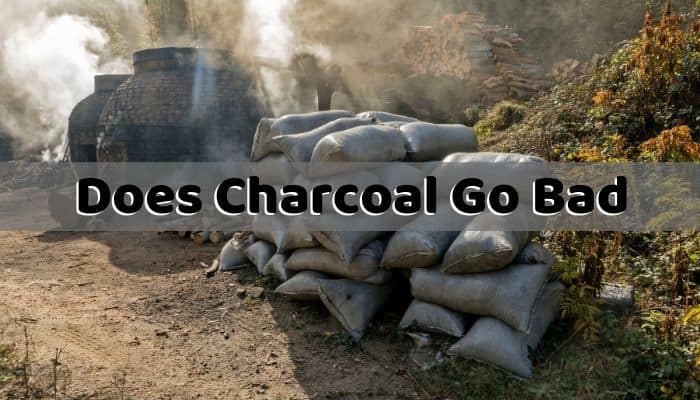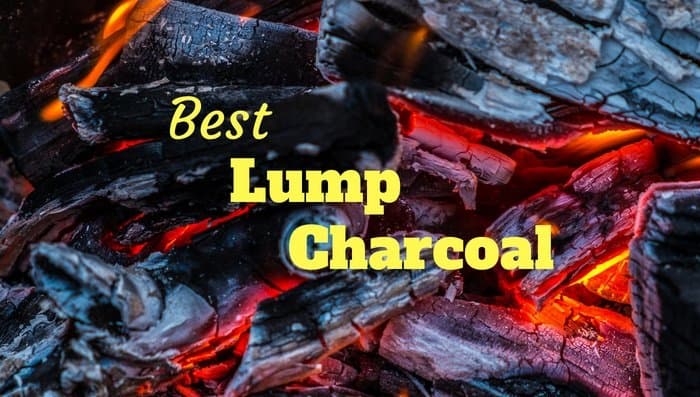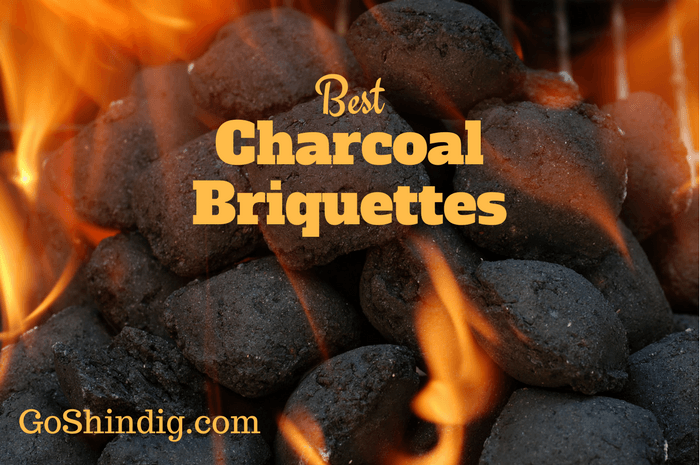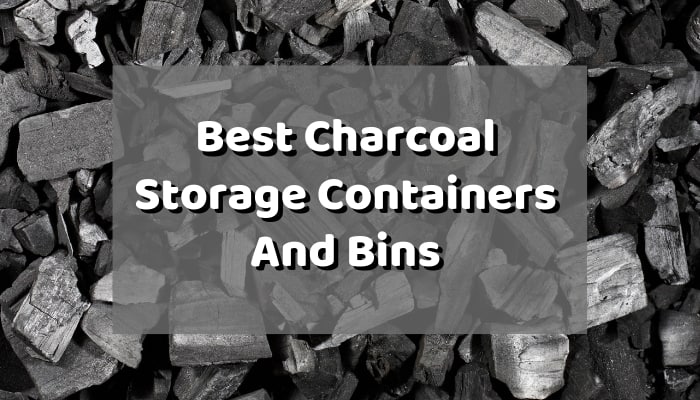If you love grilling as much as we do, you probably look forward to that first cookout of the season. Uncovering the grill and checking your tools, you find the trusty bag of charcoal. But staring into its partially used contents, you have to start to wonder – Does charcoal go bad? How long can you keep charcoal? Does charcoal go bad if it gets wet? How are you supposed to store charcoal? If you are asking yourself any of these questions right now, then keep reading. We are here to answer all of your questions about charcoal and its longevity.

Contents
What is Charcoal?
Let’s start by answering the most essential question – what is charcoal? Charcoal is the product of wood that has burned slowly without oxygen. Charcoal is also the most popular fuel source for backyard barbecue enthusiasts. Cooking with charcoal gives food a delicious, natural, and distinct flavor that is impossible to achieve with a gas grill.
Want to know the other advantages charcoal has over gas? We put charcoal grills head-to-head against gas grills – find out how they measure up.
Types of Charcoal
Charcoal is the fuel of choice for many grill masters, but their preference for type tends to differ. While no two charcoals are the same, most will fall into one of two categories: lump charcoal or charcoal briquettes. And each is useful in different grilling scenarios.
Lump Charcoal
The original charcoal, lump charcoal is also known as charwood or natural lump charcoal.
The best lump charcoal has no additives and is made from 100% hardwood. Lump charcoal is the result of burning wood in the absence of oxygen, creating an almost pure carbon product. The type of wood used – pecan, apple, hickory, etc. – can help impart a delicious flavor to any food cooked over its smoke.
Many people prefer lump charcoal because of its quick ignition and capacity for high temperatures. But because it burns hotter it also burns quicker and a little less evenly than briquettes. It is perfect for quick grilling sessions, like hamburgers, hotdogs, thin cut meats, or grilled veggies.
Charcoal Briquettes
Generally, everyone’s first instinct when they hear “charcoal” is to picture briquettes. They are the ever popular option, found at most every backyard barbecue. Briquettes are essentially compacted nuggets of sawdust. They are often pretreated with lighter fluid or other chemicals for quick ignition. Briquettes were made for long cook times, so if you want to go low and slow, briquettes are the way to go. They also have the additional benefit of being fairly inexpensive and easy to use.
Because they have additional filler ingredients to help them hold their shape, briquettes are capable of burning for much longer than lump charcoal. They also give you a little more control over the heat. However, due to the accelerant coating, some briquettes do give off acrid smoke when first ignited. “Natural” briquettes are just wood scraps and starch and are a more environmentally friendly option. We also recommend checking out our buyers guide to finding the best charcoal briquettes.
Pro tip – Want to get the best of both worlds? You can get the smokiness of the lump charcoal by tossing a handful of your favorite hardwood lump charcoal on top of hot briquettes.
Charcoal vs Firewood
So we all know the best part of grilled food is that delicious, smoky flavor. In regards to charcoal, that flavor comes from the kind of wood burned to produce the charcoal. So why not go straight to the source and burn firewood instead? It is definitely an option, but one we don’t usually recommend. Using firewood as your fuel source is notoriously difficult. It can add a lot of flavor, but it’s incredibly easy to use too much and the flavor will overpower your food.
Firewood also tends to vary in size and shape, making it a little more difficult to control the temperature. Lump charcoal is often considered a happy medium for those who want the best of both charcoal and firewood. But if that’s not enough smoky flavor for you, you can also toss a small amount of firewood on burning charcoal to take the wood flavor up a notch. Each kind of wood has its own flavor. Play around and try different types of woods to build your own personal BBQ style and flavor profile.
Can Charcoal Spontaneously Combust?
We aren’t sure how the rumor started, but no – charcoal can not spontaneously combust. House coal is a different story. House coal is a fuel many people use to heat their homes, and in some cases has been known to spontaneously combust. Grilling charcoal? Not going to happen.
Why not? Well, combustion occurs when heat forms from pressure. You would have to have an incredible amount of charcoal (more than what could fill an entire barn) to generate that kind of pressure. Never fear – your backyard barbecue bag of charcoal is safe from combustion.
Does charcoal go bad?
Charcoal is mostly carbon and highly stable. It can literally last forever. Can you use old charcoal? Absolutely! Scientists have found charcoal created from burning plants millions of years ago. That charcoal is still capable of being burned today!
While in ideal conditions charcoal can last forever, some environmental elements can adversely affect charcoal. So whether you are using briquettes or lump, you should always store your charcoal in a cool, dry place. The biggest enemy of charcoal is moisture. Charcoal is highly porous and easily absorbs moisture, so exposure to rain or humidity can often cause your charcoal not to light. However, if that happens, don’t consider all hope lost.
What Happens If Charcoal Gets Wet?
Does charcoal go bad if it gets wet? It can, but it may also be salvageable. It depends on the type of charcoal and the amount of exposure to moisture. Briquettes are the most susceptible to moisture. If your briquettes were left out in the rain, you may find that they crumble when you pick them up. Fortunately for you, briquettes are fairly inexpensive, so replacing a bag of briquettes is worth cutting your losses.
If the briquettes are still solid or you have wet lump charcoal, then lay them out in a single layer outside in the sunshine. Let them dry for a couple of days, flipping them over each day until they are completely dry to the core.
The best plan of action when attempting to use charcoal that you have dried out is to use fresh charcoal first as a starter. With the fresh fuel on the bottom, your wet-to-dry charcoal will have an easier time of igniting. You can also get your charcoal burning faster by using a chimney starter. You might be wondering can charcoal get moldy? The answer is yes. While it is probably still safe to use due to the high temperatures, we recommend keeping it in the chimney starter for a little longer than regular charcoal. But if you care about the taste of your food at all, we’d forego ever using moldy charcoal. Just trust us on this one.
How Long Can You Keep Charcoal
So let’s say you store your charcoal in a cool, dry place and keep it safely away from any moisture. How long is charcoal good for? Does it have a shelf life? Again, this will depend on the type of charcoal.
Lump charcoal is ridiculously solid and made to last. Its shelf life is indefinite if stored properly. Briquettes on the other hand, tend to only be good for around one to two years. This is due to the lighter fluid they were treated with. If your bag wasn’t kept airtight, it is likely the chemical additives have evaporated. If you don’t plan to use an entire bag of charcoal within a very short window of time, an airtight container is essential to the longevity of the charcoal.
How to Store Charcoal
A short term storage solution for charcoal is just making sure that your bag is sealed. More long term – you are going to want storage that is airtight and waterproof. We have taken a look at the best charcoal storage containers and determined that most people either opt for a metal trash can, portable bins or buckets, or stackable storage.
Metal trash cans, like this 10-gallon model from Behrens, are growing in popularity. They come in a wide variety of sizes; are rust, fire, and heat resistant; and they are also typically inexpensive. However, metal trash cans tend not to be as airtight as a charcoal bin or bucket. The Traeger 20-pound metal bucket includes an incredibly tight sealing lid that keeps charcoal safe and sound from the outdoor elements.
If you are someone who likes to stock up on larger quantities of charcoal, a bigger storage container is going to be necessary. Stackable storage is a great high capacity option that doesn’t take up much space. We prefer this two bin pack from Suncast for its eighteen gallon capacity and easy access front opening flap. They are great for easily storing charcoal on a porch or in a garage.
Once you have found the perfect charcoal storage system for you, you should also consider your storage spot. Ideally, it should be someplace cool and dry, like a garage or basement that is naturally dry. Struggle with humidity? You may need to consider a dehumidifier in your storage area. Your charcoal should also be kept elevated off the ground to avoid any collecting moisture. Also, avoid windows or any direct source of sunlight.
| Some more great charcoal advice |
|---|
| Charcoal Grills |
| Charcoal Vs Gas |
| Grilling in the Rain |
Conclusion
It is possible for charcoal to go bad from time to time, but hopefully, we have answered all of your questions about how to make your charcoal last. Now you should be ready to fire up your favorite charcoal grill, add your best charcoal, and cook with both confidence and a little more know-how. As long as you store your charcoal correctly, you can stockpile fuel to last you all year round.



When I first started grilling I used to dump my used briquets in a bucket of water to put them put when I was done then I could reuse them and long as I let them dry completely. Now that have been doing it a while I just put the cover on the grill and let the lack of oxygen put them out.